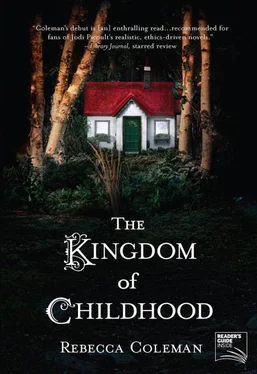Rebecca Coleman - The Kingdom of Childhood
Здесь есть возможность читать онлайн «Rebecca Coleman - The Kingdom of Childhood» весь текст электронной книги совершенно бесплатно (целиком полную версию без сокращений). В некоторых случаях можно слушать аудио, скачать через торрент в формате fb2 и присутствует краткое содержание. Город: Ontario, Год выпуска: 2011, ISBN: 2011, Издательство: MIRA Books, Жанр: Современная проза, на английском языке. Описание произведения, (предисловие) а так же отзывы посетителей доступны на портале библиотеки ЛибКат.
- Название:The Kingdom of Childhood
- Автор:
- Издательство:MIRA Books
- Жанр:
- Год:2011
- Город:Ontario
- ISBN:978-1-4592-1383-8
- Рейтинг книги:5 / 5. Голосов: 1
-
Избранное:Добавить в избранное
- Отзывы:
-
Ваша оценка:
- 100
- 1
- 2
- 3
- 4
- 5
The Kingdom of Childhood: краткое содержание, описание и аннотация
Предлагаем к чтению аннотацию, описание, краткое содержание или предисловие (зависит от того, что написал сам автор книги «The Kingdom of Childhood»). Если вы не нашли необходимую информацию о книге — напишите в комментариях, мы постараемся отыскать её.
was a semifinalist in the 2010 Amazon Breakthrough Novel Competition. An emotionally tense, increasingly chilling work of fiction set in the controversial Waldorf school community, it is equal parts enchanting and unsettling and is sure to be a much discussed and much-debated novel.
The Kingdom of Childhood — читать онлайн бесплатно полную книгу (весь текст) целиком
Ниже представлен текст книги, разбитый по страницам. Система сохранения места последней прочитанной страницы, позволяет с удобством читать онлайн бесплатно книгу «The Kingdom of Childhood», без необходимости каждый раз заново искать на чём Вы остановились. Поставьте закладку, и сможете в любой момент перейти на страницу, на которой закончили чтение.
Интервал:
Закладка:
The rented house came fully furnished and appointed, with a lovingly tended garden out back and views of farmlands and a distant steeple. Sonic booms from American aircraft thundered frequently overhead. At John’s urging, the family cultivated the habits of the Bavarian people. Every morning at half past eight Judy’s mother hung the featherbeds out the windows to air. On weekends they ate their largest meal at noon, often after a brisk hike at Jägerkamp or Miesing. Around the supper table John frequently enthused about the fine healthy practices of the Germans, such as playing sports well into adulthood and not being nosy about their neighbors.
When they first moved into the home, the garden was in full bloom: bright red poppies, the purple globes of thistle, delicate and poisonous cups of foxglove, bleeding heart blossoms hanging on a stalk like a string of predictions. Blueberries burst ripe on the bushes, and Judy liked to eat them as she played, imagining herself to be a caveman’s child traveling through a wild land never before seen by human beings. Her own Eden, a child’s Eden with no lurking specter of defilement, no serpent watching her; she slipped the slender cups of foxglove over her fingers, licked the backs of poppy and nasturtium petals to make designs on her bare legs. Her sandals slouched in the dirt beside the hens-and-chicks that lined the rock garden, the plants swollen with rain and primeval as her fantasies.
At breakfast her mother served her a hard roll from the market and a soft-boiled egg in a leaf-green eggcup. She hung out the featherbeds and lined the birdcage with page four of the Stars and Stripes. She tapped the cat’s bowl five times on the back porch and then walked Judy to the bus stop one mile away.
At the new school nothing was familiar. Judy could not write in the impeccably tidy rounded hand with its looping G ’s and calligraphic H ’s. She spoke no German, could not read music, knew no prayers. At reading time the class read moral tales from Der Struwwelpeter, a large flat book on whose cover a pigeon-chested boy stared outward with a hollow expression, his fingernails grown to hideous claws, his yellow hair like steel wool. A billowing red shirt and green tights clad his stumpy body. She could not understand the poem about him, and was glad.
As cooler weather crept in, the blueberry bushes turned a flaming red. The bleeding hearts shriveled, and the remaining plants revealed their skeletons: the dry rattling husks of the poppies, the fragile mother-of-pearl leaves of the bony beige Silbertaschen. Only the chrysanthemums remained, their slim white petals bursting like fireworks from a tight little but ton of a head, the last flower before winter. Judy was largely bored, and so often her mother sent her to play at the home of a German girl, Daniela, their nearest neighbor a few lots away.
They didn’t speak the same language. That was part of the problem, although Judy doubted she and Daniela would have been friends in any tongue. The girl was overbearing and precociously athletic, while Judy frequently missed any ball rolled to her in kickball and felt her bladder seize at the very thought of climbing a rope. Daniela’s idea of fun was to demonstrate a gymnastic trick and encourage Judy to try it, and then, when she failed, to jeer at her in the universal language of mockery. She was the baby of her family, with an older sister and brother who rolled their eyes at her outbursts in a way Judy could not. By October Judy had given up on Daniela and, when forced to play at her house, walked straight around back to the barn and hung out with the girl’s older brother, Rudi, who spoke serviceable English. Sometimes she did her homework in the barn, and as she worked he helped her untangle the incomprehensible words before her.
“Der Struwwelpeter!” Rudi exclaimed one day, when she pulled out the text and her copybook. “A terrible book!”
Judy smiled broadly with relief. So she wasn’t alone in detesting the thing. “Did you have to read it?”
“Of course. It’s to frighten children. To make you behave and have bad dreams at night.” He sat beside her on the bale of straw and flipped it open to a story about a girl who played with matches. He read with enthusiasm:
“Doch Minz und Maunz, die Katzen,
Erheben ihre Tatzen.
Sie drohen mit den Pfoten:
‘Die Mutter hat’s verboten!’”
Judy said, “I don’t know what any of that means.”
Rudi rolled his hand in the air, suggesting a broad translation. “It means that when Pauline lit her match, the cats Minz and Maunz put out their claws, and cried, and said, ‘Your mother has forbidden it!’”
Judy nodded. “And then she burns to death and turns into a pile of ashes.”
“Yes,” affirmed Rudi. The humorous creases at the corners of his eyes belied his serious tone. Quoting from the book, he said, “‘It’s very, very wrong, you know. You will be burnt if you do so.’”
“You made it rhyme in English.”
“I did not even realize. You should not read these things. Look at der Struwwelpeter on the front. Your hair is not like this. Your nails are short and neat.” He lifted her hand in his own rough one and examined her fingernails, then briskly rubbed her fingers with a clasp of his thumb. “You see? No reason to read this. You are a good little girl, not a bad one. You should read a happy book.”
“My teacher says I have to read this one.”
The bale shifted beneath his weight as he leaned toward her. His smiling face came close enough that she could see the blond shadow on his jaw, the midnight-blue ring around his cornflower irises. In his low, conspiratorial voice he said, “Sometimes teachers are wrong.”
The blasphemy was so absolute that she laughed. His eyelashes batted once at her laughing breath. He sat up, his grin still fixed in place, and rubbed her back in broad, firm circles, the way he stroked the cow before he milked her.
By December even the dead garden was gone. Night fell quickly and left her no time to be bullied by Daniela or watch Rudi care for the sheep and muck out the barn. There was only her home, where her mother had taken to daily plucking imperfect leaves from the houseplants and arranging the kitchen tools in order by shade of black. And there was school.
On the first day of Advent her class made windows of colored tissue and Popsicle sticks, covered in squares of black construction paper split down the middle. The teacher hung their creations on the long wall of glass windows, regimentally neat as Judy’s mother’s spatula drawer. But each day a child would fold back the construction paper to reveal the bold fractured rainbow inside. They practiced songs for the Weihnachtskonzert to be held just before Christmas and rolled salt dough into kings and shepherds for nativity scenes. Every Friday their teacher laid an evergreen wreath, set with candles, on a desk, then took out her guitar and dimmed the lights. Together as a class, in the dark and accompanied by the plaintive guitar, they sang a quiet and meditative Advent hymn. Then the teacher struck a match and lit one candle, then two, then three, as Christmas drew closer and closer.
It was like undressing together, this frankness about spirituality. To John Chandler, Christianity was a tourist attraction that came in the form of holiday street festivals and medieval churches. He took his family along as though on safari, looking upon the holiday goods as though these were relics of a primitive tribe which viewed volcanic eruption as evidence of the Sun God’s anger. Judy guessed he didn’t know about the overt Catholicism of the Bavarian public schools, and that if he had, he would have assumed her intelligent enough to pay it no mind. But in the snowy darkness of the German winter, singing in unison in the candlelight, Judy was starting to suspect she might love Jesus.
Читать дальшеИнтервал:
Закладка:
Похожие книги на «The Kingdom of Childhood»
Представляем Вашему вниманию похожие книги на «The Kingdom of Childhood» списком для выбора. Мы отобрали схожую по названию и смыслу литературу в надежде предоставить читателям больше вариантов отыскать новые, интересные, ещё непрочитанные произведения.
Обсуждение, отзывы о книге «The Kingdom of Childhood» и просто собственные мнения читателей. Оставьте ваши комментарии, напишите, что Вы думаете о произведении, его смысле или главных героях. Укажите что конкретно понравилось, а что нет, и почему Вы так считаете.












